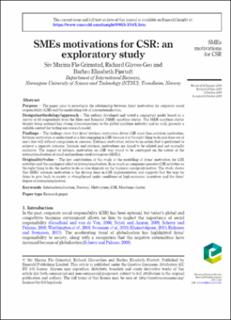SMEs motivations for CSR: an exploratory study
Peer reviewed, Journal article
Published version

Åpne
Permanent lenke
https://hdl.handle.net/11250/2649546Utgivelsesdato
2020Metadata
Vis full innførselSamlinger
Originalversjon
http://dx.doi.org/10.1108/EBR-01-2019-0014Sammendrag
Purpose
The paper aims to investigate the relationship between firms’ motivation for corporate social responsibility (CSR) and the moderating role of internationalisation.
Design/methodology/approach
The authors developed and tested a conceptual model based on a survey of 65 respondents from the Møre and Romsdal (M&R) maritime cluster. The M&R maritime cluster despite being national has strong interconnections to the global maritime industry and as such, presents a suitable context for testing our research model.
Findings
The findings show that firms’ intrinsic motivation drives CSR more than extrinsic motivation. Intrinsic motivation is understood as a firm engaging in CSR because it is the right thing to do and done out of one’s free will without compulsion or coercion. Extrinsic motivation relates to an action that is performed to achieve a separate outcome. Intrinsic and extrinsic motivations are found to be related and not mutually exclusive. The impact of intrinsic motivation on CSR was found to be contingent on the extent of the internationalisation of small and medium-sized enterprises (SMEs).
Originality/value
The key contribution of the study is the modelling of firms’ motivation for CSR activities and the contingent effect of internationalisation. In as much as companies perceive CSR activities as the right thing to do, the motive to do so also depends on the business case/profit motive. The study shows that SMEs’ intrinsic motivation is the driving force in CSR implementation and suggests that the urge by firms to give back to society is strengthened under conditions of high economic incentives and the firms’ degree of internationalisation.
